A cross-country bike trek to Beng Mealea, believed to have inspired Angkor Wat, is well worth the wobbly legs, sweat and strain it takes to get there
- Published: 10/06/2012
- Writer: Joe Minihane
- Bangkok Post
Our bikes crunch across wet gravel as we turn
off the Siem Reap to Phnom Penh highway. While we amble down one of the
many dirt roads that snake their way out of Siem Reap towards the
countless small villages dotting the flat landscape, monks collect
morning alms from makeshift food stalls. With a squeeze of his brakes,
our guide, Samnang, slows to a halt, pointing to four uniformed men in
an adjacent field, trailing a huge device that looks like a metal
detector near a white, UN marked Land Rover. ''Training to clear
landmines,'' he says. ''They've already cleared many temple sites, but
there's much work left to do.''
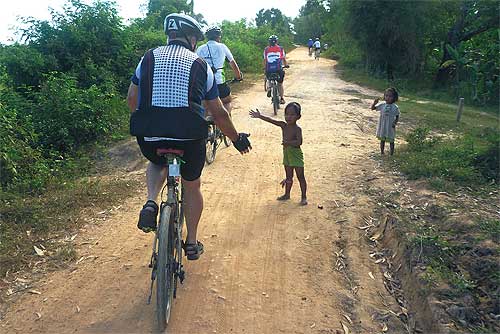 WELCOMING COMMITTEE: Cyclists in rural Cambodia are a major
attraction for children in the area who rush out to shout ‘hello’ and
‘barang’ (foreigner).
WELCOMING COMMITTEE: Cyclists in rural Cambodia are a major
attraction for children in the area who rush out to shout ‘hello’ and
‘barang’ (foreigner).
It's a stark reminder that this country, and this area in particular,
still suffers the horrific after-effects of the Khmer Rouge's brief but
brutal rule.
We're on the road to Beng Mealea, an ancient temple site that sits
more than 50km north of Siem Reap town, which was itself heavily mined
until a few years ago. It's also close to the jungle hideouts where Pol
Pot and his henchmen holed up for most of the '90s, protecting
themselves with fields of landmines. Our ride there will cover 75km
through lush paddy fields, arid landscapes and tiny villages.
The trip will take us off the beaten track, in search of the Cambodia
which many visitors to this area easily miss in the clamour to see the
glamourous temples of Angkor. While Angkor Wat fast approaches its
much-publicised 900th birthday next year, Beng Mealea predates the
temple of the Cambodian flag. Its floor plan is even identical to that
of Angkor Wat.
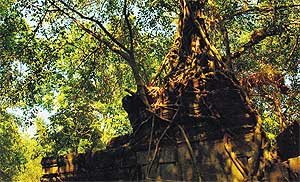 MOTHER NATURE WINS OUT: Tree roots cascade down the walls of 1,000-year-old ruins.
MOTHER NATURE WINS OUT: Tree roots cascade down the walls of 1,000-year-old ruins.
We are being shown this beautiful part of the country by Grasshopper
tours, a bike-focused company based in Siem Reap. They run trips across
Cambodia, Laos and Vietnam, from short hops through the local
countryside to epic five-day jaunts from Phnom Penh to Hoi An on the
Vietnamese coast. For just US$48 (1,520 baht) each, my girlfriend and I
both have top of the range Trek mountain bikes, prepared to our own
specifications so the saddles sit perfectly beneath us.
There's also Samnang's peerless local knowledge and motivation when
our legs start to flag. And, most importantly of all, a support tuk-tuk,
pootling behind us at a safe distance and loaded to the rafters with
ice cold water and fresh local fruit.
The stark reality of land-mine clearances is still fresh in my mind
as we leave the dirt road behind and wind our way through a series of
stilt houses.
Rattling over wooden bridges and down gullies dried out thanks to
months without rain, we slow to a crawl as Samnang points to two huge
wicker cages, each one housing a proud-looking fighting cock.
''Cockfighting is illegal in Cambodia now,'' he says. ''But that doesn't
stop locals staging fights.'' Birds like these sell for more than $100
he tells us, a vast sum considering the minimum wage here is set at $45 a
month and is often much less. Overhearing our conversation, the birds'
owner appears and speaks chirpily to Samnang.
By now it's nearly 9am, the burgeoning heat of the day burning off
the high clouds and leaving us gleaming with sweat as the pace quickens
and we crank through the gears.
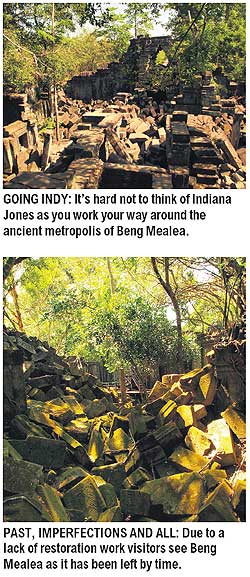
As the ride gets tougher, support comes in the form of an endless
line of children appearing from schools and houses along the tree-lined
route. They all wave heartily and shout hello and, I think, ''bye-bye''.
It's not until we pass the last row of houses and nose our bikes onto
the sweltering asphalt of a busy main road that Samnang tells me they
were actually just shouting ''barang'', the Khmer equivalent of farang.
After spending a few days in the tourist-heavy streets of Siem Reap,
it's certainly great to feel novel.
With our energy levels fading fast, we pull over at a sugar cane
seller, who hands over ice cold glasses of juice that set our teeth
buzzing.
As we drain them, our tuk-tuk moseys up behind us. We wolf down
bananas, swig bottled water and then it's time to tackle the last long
stretch of our journey.
The temperature is now well above 30C and despite the going being
relatively flat, the ride is fast becoming an endurance test. The final
30km feels never-ending, especially after the pleasant encounters of the
morning. But as we ease our bikes through the gates of Beng Mealea, the
pain and the sweat are totally worth it. The sun blazes as we leave our
trusty steeds by the tuk-tuk and take in our first, breathtaking views
of this faded former Khmer capital.
The imposing entrance to this near 1,000-year-old Hindu complex is
reached by crossing a lush, lily-covered moat and walking through forest
which was only cleared of land-mines by German workers in 2007, as the
UN signs that dot the path testify.
Samnang, still dressed in his cycling clobber and now acting as our
temple guide, leads us through the arch of the entrance and into an
enchanting world straight out of Indiana Jones or Lara Croft.
Unlike many of the temples of Angkor, Beng Mealea has remained
untouched by foreign-funded restoration teams. This means the central
hall, libraries and outer walls are either fully or partially collapsed,
while nature has begun to reclaim the ancient brickwork. Fig trees
tower above us, their trunks standing to attention from the top of 10m
high walls, the roots snaking down to the ground.
Debate is currently raging as to whether it's time to spruce up Beng
Mealea, bringing it back to its former glory and subsequently cashing in
on the huge tourist numbers who visit nearby Angkor in their droves. As
a local, Samnang remains unconvinced. ''Part of the beauty of this
place is that it remains as it was found,'' he says. ''It's harder to
get to and more rewarding. Restoration here would change things for the
worse.''
Exploring further, there are signs everywhere of Beng Mealea's
position as the centre of the Khmer empire before King Suryavarman II,
fearing marauders from across the nearby border, moved his capital to
Angkor.
A small, weather-beaten bas-relief, detailing the ''churning of the
sea of milk'', an attempt by the gods to gain eternal life, mirrors
exactly a much vaster scene at the rear of Angkor Wat.
Indeed, Suryavarman even used the floor plan of Beng Mealea as the
basis for Angkor Wat. Standing here, in the cooling shade, it's clear
where inspiration for the most famous temple in Southeast Asia came
from.
Wooden decking allows visitors to climb across the ruins and get
different angles on this stunning site. It means you can peer into dark,
untouched recesses of the central temple, or simply pause and listen to
the breeze rustling the leaves. When we take time to do this, we
realise that in all our time exploring the temples of Siem Reap, this is
the first time we have been the only tourists around. Clambering over
ancient stone and listening to the silence, it's hard not to be
transported back to when this was a bustling Hindu metropolis.
Thankfully, we're not cycling back. With the bikes strapped
precariously to our rickety ride, we slide onto the hot leather seats of
the tuk-tuk and doze.
As the afternoon sun begins to dip and we edge back to reality, I
think of everyone perspiring right now among the crowds at Angkor and
realise that little, hidden Beng Mealea is undoubtedly the most
rewarding temple to see in Cambodia _ especially after putting in some
serious pedal power to get there.
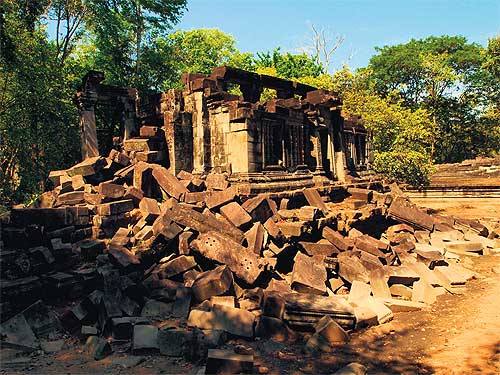 LEVELLED LEARNING CENTRE: One of two ruined libraries which sit on
either side of Beng Mealea’s central hall. PHOTOS: JOE MINIHANE
LEVELLED LEARNING CENTRE: One of two ruined libraries which sit on
either side of Beng Mealea’s central hall. PHOTOS: JOE MINIHANE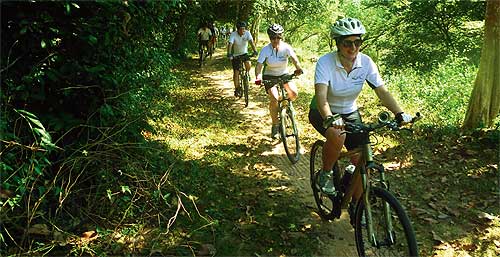 HOT WHEELS: Top range mountain bikes help riders ease into the journey. PHOTOS: COURTESY OF GRASSHOPPER ADVENTURES
HOT WHEELS: Top range mountain bikes help riders ease into the journey. PHOTOS: COURTESY OF GRASSHOPPER ADVENTURES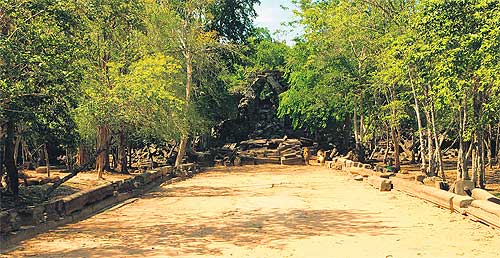 LEAVE IT ALONE: The collapsed temple entrance is surrounded by towering trees.
LEAVE IT ALONE: The collapsed temple entrance is surrounded by towering trees.
1 comment:
Ohohohohoh, Its so cute...the boy in this pic!!
Post a Comment